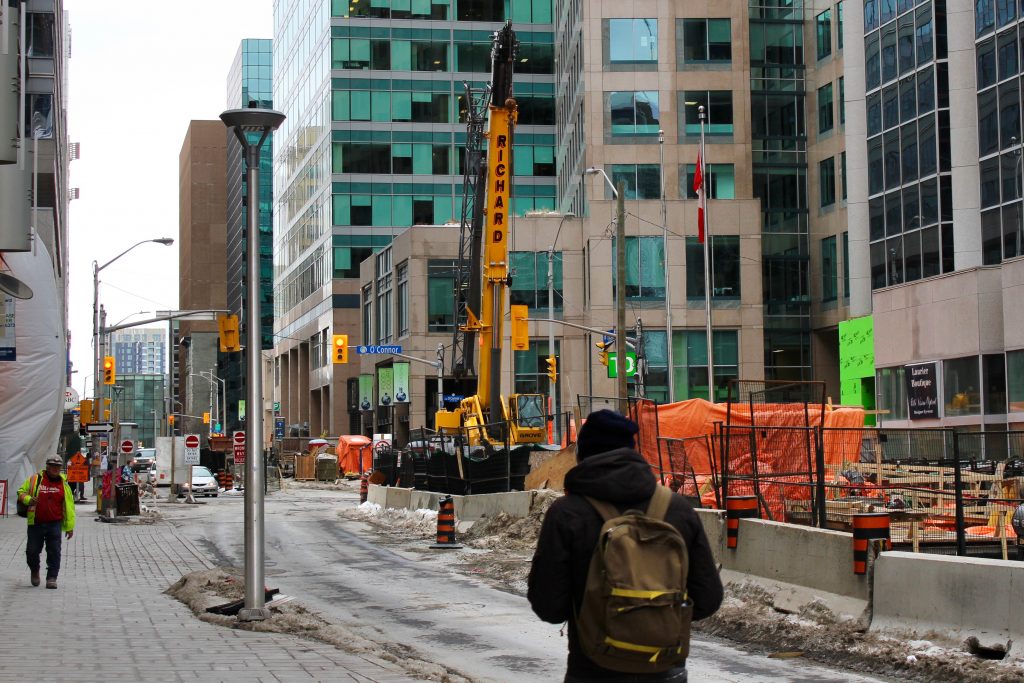Rail line setback rankles critics
By Mac White
Ottawa residents will have to wait even longer to ride their new light rail transit system after the city pushed back the expected completion date of the $2.13-billion LRT project by six months.
The 12.5-km, 13-station Confederation Line project connecting Tunney’s Pasture to Blair Station was originally scheduled to be finished by May 24. Instead, it is now scheduled to open at the end of November.
The city also announced the project’s builder, Rideau Transit Group, will not face the $1-million late fee that was written into the original contract — at least not yet; the penalty deadline has also been delayed six months.
According to the city’s website, the transit line is “Ottawa’s largest transportation infrastructure project since the building of the Rideau Canal.” The master plan was approved in 2008 before construction crews broke ground in the spring of 2013.
Several city councillors, including Diane Deans, Tobi Nussbaum and Riley Brockington, have publicly voiced their displeasure over the delay and the lack of financial penalty.
“We knew that a delay was very possible, so I wasn’t surprised. But I was maybe more surprised of the number of months going all the way to November,” said Brockington, councillor for River ward.
“With respect to the penalty, I was under the impression the city (could) trigger a monetary penalty if the system wasn’t handed over in May 2018. At no time did I not think that. I was quite surprised.”
At a Feb. 6 finance and economic development committee meeting, it was revealed that RTG had told the city that the massive Rideau Street sinkhole in June 2016 “caused the construction schedule to shift.” The sinkhole reportedly flooded 300 metres of the underground tunnel, triggering what RTG project director Eugene Creamer called “significant and unavoidable impacts.”
Smaller sinkholes also occurred nearby in February 2014 and November 2017.
John Rakos, a professor at the University of Ottawa’s Telfer School of Management, said sudden technical changes to infrastructure projects like the LRT tend to cause cost and time-related problems.
“Underestimating the technical complexity of the project likely caused most of the delays in the LRT project — not adding cost and time for risks. I’m sure safety issues were added in,” said Rakos, “but they estimated how long it should take if nothing goes wrong.”
Brockington raised questions at the meeting about how much construction and other costs would rise during the delay.
In a Feb. 14 memo to Mayor Jim Watson and the rest of city council, city manager Steve Kanellakos estimated that an unexpected $8-$10 million per month will be incurred by RTG for things like prolonging bus service until November (numerous routes will be replaced by the LRT), labour costs and monitoring expenses.
“Almost every project has some sort of problem or failure or thing that doesn’t work out and is changed or adjusted,” said Quinn Nicholson, a communications director for the Edmonton’s Valley Line Southeast LRT delivery project.
Like Ottawa, Edmonton also missed the opening date on its Metro Line expansion — albeit due to problems with the signaling system.
“It absolutely sucks when you lose that first opening date,” said Nicholson. “Sometimes they go over very well, but sometimes one little piece gets out of line and it spirals into a whole other set of problems.”
City staff said they do not believe the second stage of LRT expansion — including rail line extensions to the Ottawa airport in the south, Moodie Drive in the west and Trim Road in the east by 2023 — will be impacted by the Confederation Line delay.

